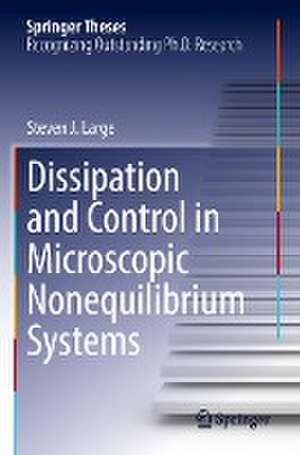Dissipation and Control in Microscopic Nonequilibrium Systems: Springer Theses
Autor Steven J. Largeen Limba Engleză Paperback – 25 oct 2022
| Toate formatele și edițiile | Preț | Express |
|---|---|---|
| Paperback (1) | 1106.00 lei 6-8 săpt. | |
| Springer International Publishing – 25 oct 2022 | 1106.00 lei 6-8 săpt. | |
| Hardback (1) | 1111.97 lei 6-8 săpt. | |
| Springer International Publishing – 24 oct 2021 | 1111.97 lei 6-8 săpt. |
Din seria Springer Theses
- 18%
 Preț: 997.88 lei
Preț: 997.88 lei -
 Preț: 389.88 lei
Preț: 389.88 lei - 15%
 Preț: 646.94 lei
Preț: 646.94 lei - 18%
 Preț: 943.43 lei
Preț: 943.43 lei -
 Preț: 399.29 lei
Preț: 399.29 lei - 18%
 Preț: 944.99 lei
Preț: 944.99 lei - 15%
 Preț: 636.80 lei
Preț: 636.80 lei - 18%
 Preț: 941.05 lei
Preț: 941.05 lei - 15%
 Preț: 643.16 lei
Preț: 643.16 lei - 15%
 Preț: 642.68 lei
Preț: 642.68 lei - 18%
 Preț: 1103.62 lei
Preț: 1103.62 lei - 20%
 Preț: 558.82 lei
Preț: 558.82 lei - 18%
 Preț: 1112.30 lei
Preț: 1112.30 lei - 18%
 Preț: 944.19 lei
Preț: 944.19 lei - 18%
 Preț: 1109.92 lei
Preț: 1109.92 lei - 18%
 Preț: 1217.27 lei
Preț: 1217.27 lei - 15%
 Preț: 640.06 lei
Preț: 640.06 lei - 15%
 Preț: 636.45 lei
Preț: 636.45 lei - 15%
 Preț: 640.06 lei
Preț: 640.06 lei - 15%
 Preț: 640.88 lei
Preț: 640.88 lei -
 Preț: 389.70 lei
Preț: 389.70 lei - 20%
 Preț: 563.89 lei
Preț: 563.89 lei -
 Preț: 393.35 lei
Preț: 393.35 lei - 15%
 Preț: 637.93 lei
Preț: 637.93 lei - 15%
 Preț: 641.85 lei
Preț: 641.85 lei - 18%
 Preț: 1225.94 lei
Preț: 1225.94 lei - 20%
 Preț: 551.36 lei
Preț: 551.36 lei - 18%
 Preț: 1229.10 lei
Preț: 1229.10 lei - 15%
 Preț: 639.25 lei
Preț: 639.25 lei - 18%
 Preț: 999.45 lei
Preț: 999.45 lei - 15%
 Preț: 640.06 lei
Preț: 640.06 lei - 18%
 Preț: 1220.45 lei
Preț: 1220.45 lei - 18%
 Preț: 1116.26 lei
Preț: 1116.26 lei - 18%
 Preț: 1110.72 lei
Preț: 1110.72 lei - 18%
 Preț: 1000.87 lei
Preț: 1000.87 lei - 18%
 Preț: 891.17 lei
Preț: 891.17 lei - 15%
 Preț: 640.06 lei
Preț: 640.06 lei - 5%
 Preț: 1154.07 lei
Preț: 1154.07 lei - 15%
 Preț: 635.96 lei
Preț: 635.96 lei - 15%
 Preț: 640.88 lei
Preț: 640.88 lei -
 Preț: 387.20 lei
Preț: 387.20 lei - 18%
 Preț: 1109.92 lei
Preț: 1109.92 lei -
 Preț: 385.25 lei
Preț: 385.25 lei -
 Preț: 385.25 lei
Preț: 385.25 lei - 18%
 Preț: 1112.30 lei
Preț: 1112.30 lei - 18%
 Preț: 999.45 lei
Preț: 999.45 lei -
 Preț: 386.99 lei
Preț: 386.99 lei - 15%
 Preț: 637.13 lei
Preț: 637.13 lei - 20%
 Preț: 554.20 lei
Preț: 554.20 lei - 20%
 Preț: 555.57 lei
Preț: 555.57 lei
Preț: 1106.00 lei
Preț vechi: 1348.78 lei
-18% Nou
Puncte Express: 1659
Preț estimativ în valută:
211.64€ • 221.52$ • 176.15£
211.64€ • 221.52$ • 176.15£
Carte tipărită la comandă
Livrare economică 31 martie-14 aprilie
Preluare comenzi: 021 569.72.76
Specificații
ISBN-13: 9783030858278
ISBN-10: 3030858278
Pagini: 236
Ilustrații: XVII, 236 p. 49 illus., 42 illus. in color.
Dimensiuni: 155 x 235 mm
Greutate: 0.36 kg
Ediția:1st ed. 2021
Editura: Springer International Publishing
Colecția Springer
Seria Springer Theses
Locul publicării:Cham, Switzerland
ISBN-10: 3030858278
Pagini: 236
Ilustrații: XVII, 236 p. 49 illus., 42 illus. in color.
Dimensiuni: 155 x 235 mm
Greutate: 0.36 kg
Ediția:1st ed. 2021
Editura: Springer International Publishing
Colecția Springer
Seria Springer Theses
Locul publicării:Cham, Switzerland
Cuprins
Chapter 1. Introduction.- Chapter 2. Theoretical background.- Chapter 3. DNA hairpins I: Calculating the generalized friction.- Chapter 4. DNA Hairpins II: reducing dissipation in nonequilibrium protocols.- Chapter 5. DNA Hairpins III: robustness, variability, and conclusions.- Chapter 6. Stochastic control in microscopic nonequilibrium systems.- Chapter 7. Optimal discrete control: minimizing dissipation in discretely driven systems.- Chapter 8. On dissipation bounds: discrete stochastic control of nonequilibrium systems.- Chapter 9. Free energy transduction within autonomous systems.- Chapter 10. Hidden excess power and autonomous Maxwell demons in strongly coupled nonequilibrium systems.- Chapter 11. Conclusions and outlook.
Notă biografică
Dr. Steven Large grew up in Victoria, Canada, and received his undergraduate honours degree in Nanoscience in 2015 from the University of Guelph in Ontario, Canada. He then completed his PhD in Physics at Simon Fraser University in Vancouver, Canada, defending his thesis in December 2020 under the supervision of Prof. David Sivak. Currently, Dr. Large works as a Data Scientist with Viewpoint Investment Partners, in Calgary, Alberta, using quantitative analysis methods and machine learning techniques to develop robust long-term financial investment strategies.
Textul de pe ultima copertă
This thesis establishes a multifaceted extension of the deterministic control framework that has been a workhorse of nonequilibrium statistical mechanics, to stochastic, discrete, and autonomous control mechanisms. This facilitates the application of ideas from stochastic thermodynamics to the understanding of molecular machines in nanotechnology and in living things. It also gives a scale on which to evaluate the nonequilibrium energetic efficiency of molecular machines, guidelines for designing effective synthetic machines, and a perspective on the engineering principles that govern efficient microscopic energy transduction far from equilibrium. The thesis also documents the author’s design, analysis, and interpretation of the first experimental demonstration of the utility of this generally applicable method for designing energetically-efficient control in biomolecules. Protocols designed using this framework systematically reduced dissipation, when compared to naive protocols, in DNA hairpins across a wide range of experimental unfolding speeds and between sequences with wildly different physical characteristics.
Caracteristici
Nominated as an outstanding PhD thesis by Simon Fraser University Includes an accessible introduction to the mathematics that describes microscopic, fluctuating systems Advances theory and simulation of nonequilibrium systems, and experimental design and data analysis of DNA hairpins
